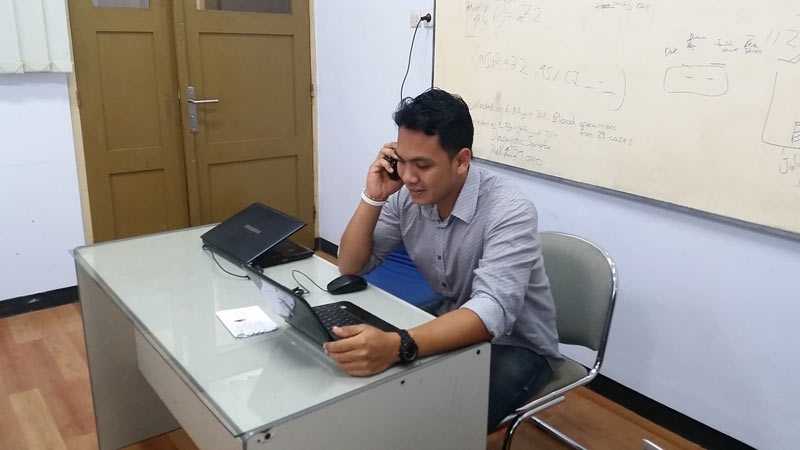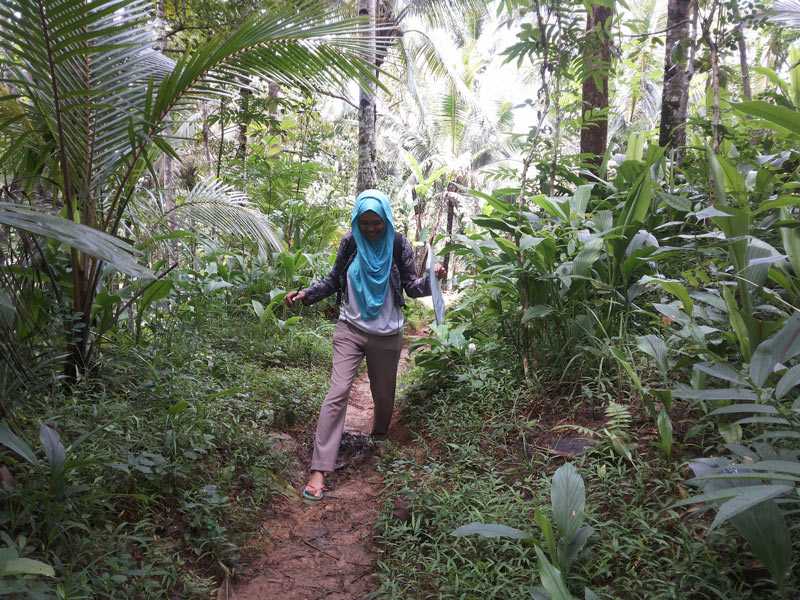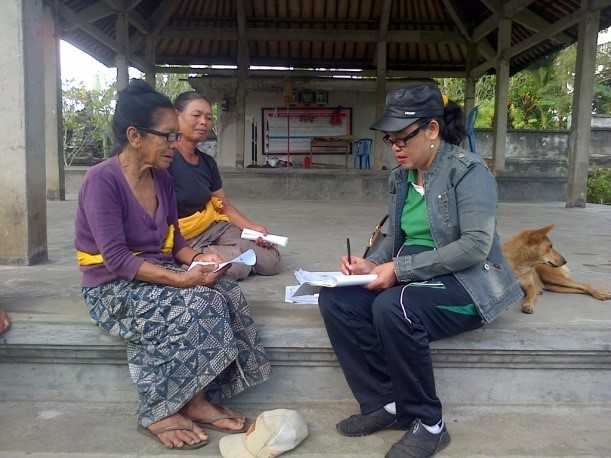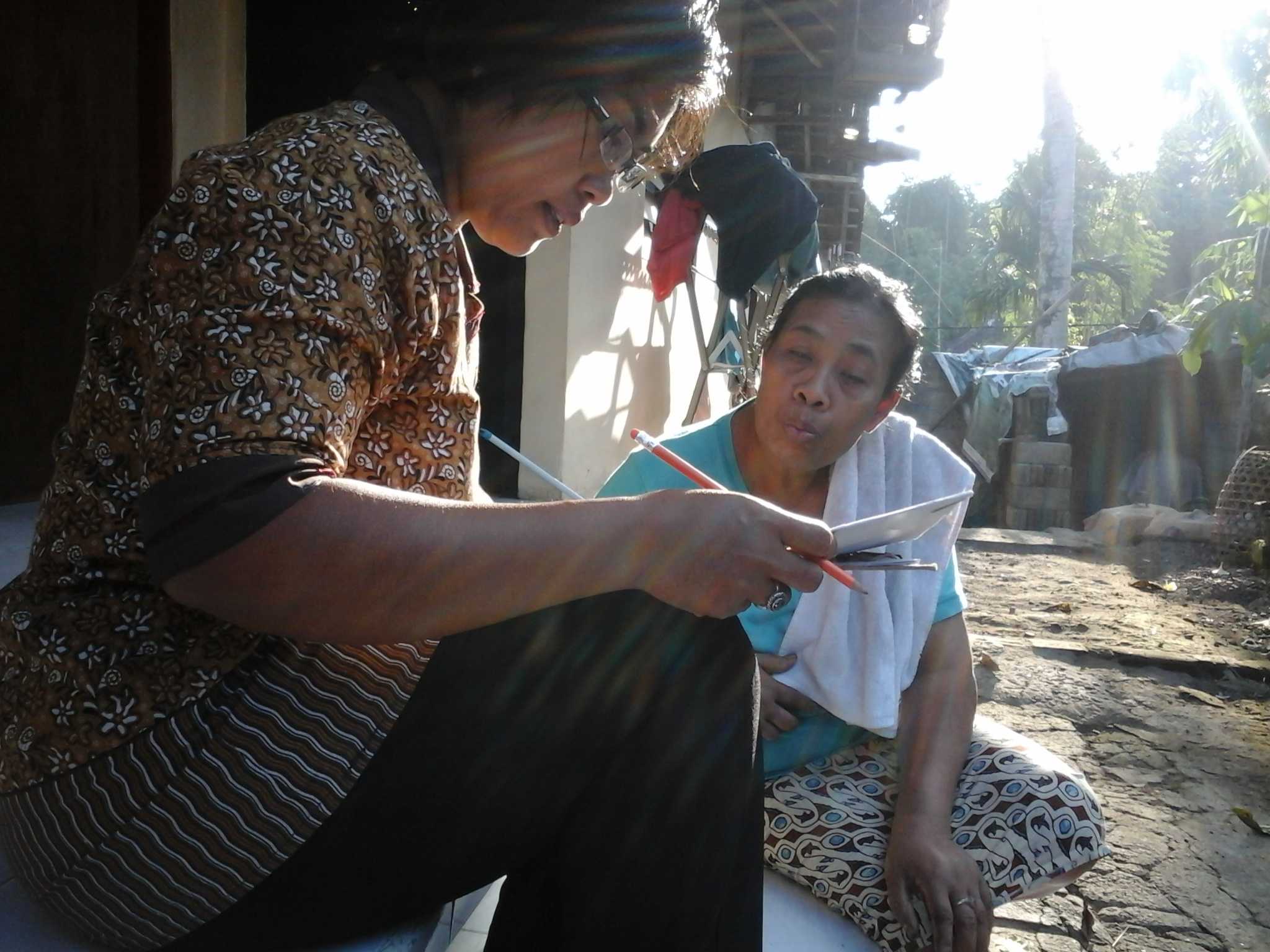Insight for Indonesia: CDC Director Mentors Disease Detective from Across the World

FETP resident Nyoman Purnawan chats with CDC Director Tom Frieden late at night in Indonesia.
It’s late at night in Indonesia, but FETP resident Nyoman Purnawan is wide awake and looking for important advice. “What do you think,” he asks brightly, “is the best way to improve our program?”
Half a world away on the other end of the phone, CDC Director Tom Frieden, MD, MPH, is ready to help. “There are two ways to address hypertension,” Frieden counsels. “One of them is to look at reducing sodium intake. The other is to improve treatment. Sodium reduction is not easy; it requires changing how people purchase and prepare food, but there are examples of it being done very effectively. For hypertension treatment, we have a proposed model which involves standardized universal care for hypertension.”

An Indonesia FETP resident walks through a plantation on the way to Semono Village in Purworejo, Indonesia during a malaria outbreak investigation in December 2014.
This type of exchange is invaluable to new FETP residents, who are hard at work in the field conducting studies, tracking infectious and non-infectious diseases, and seeking practical solutions to public health issues in their own countries. Purnawan’s focus is on noncommunicable diseases, and he has spent the past six months in Bali conducting a cross-sectional study of 242 hypertension patients at the Payangan village health clinic to determine how many stay on their medication and take it correctly, as well as what factors influence medication adherence.
During the call, which is one of a series of one-on-one conversations with the director designed to provide mentorship to FETP residents around the world, Frieden encourages Purnawan. “The topic you’ve taken is very important, because high blood pressure kills more people than anything else in the world. It kills 9 million people every year, and only 15 percent of the people in the world who have high blood pressure have it under control.”

Indonesia FETP resident Ibu Jero and Ibu Marini interview patients with high blood pressure in Payangan area, Gianyar Regency, Bali.
Purnawan tells Frieden he chose to focus his study on hypertension because of the high prevalence of the disease in Indonesia, and the fact that “Most people are non-adherent to their medication.” He says patients, many of whom face long hours working in rice fields, can have trouble staying motivated to follow through with their care. He is hoping the study will help him discover ways to change this. Frieden listens closely as Purnawan explains the study in more detail.
“Do you have any preliminary findings?” Frieden asks.
Purnawan shares some of his results, which he is still analyzing. In Bali, the main factors affecting adherence are knowledge, accessibility of health centers, and support from family and health workers.
Throughout the session, Frieden asks probing questions and offers useful resources, making connections and sharing insights gained through his experience. Frieden digs deep, inquiring about Purnawan’s methodology and getting to the root of the study’s design. He points out some possible issues, noting specifically that the current study relies on patients to be truthful, which is not always accurate. He presents an alternative: “Are you familiar with the kind of cohort analysis that was done for tuberculosis?”

FETP residents in Indonesia conduct an outbreak investigation of leptospirosis affecting farmers in the Boyolali District in Indonesia between May and June 2014.
“Yes,” Purnawan answers.
Frieden follows by stressing the importance of looking at actual control rates among those who are diagnosed. “To me, this kind of cohort analysis is the most important thing we can look at, because this will help determine how to improve, and how to give healthcare facilities information that they can use to improve outcomes.”
For Purnawan, tackling the problem of hypertension treatment is the first step in a much broader plan. He’s interested in learning about how noncommunicable disease programs in the US have been successful, and asks Frieden to send him more information. “I want to share these results with our government in Bali. I want to help make a new program for Bali and all of Indonesia for prevention of all noncommunicable diseases.”

Indonesia FETP resident conducts outbreak investigation in Bedulu Village, Gianyar Regency, Bali.
Frieden draws an immediate connection between Purnawan’s expanding interests and the ongoing issue of tobacco control. “For noncommunicable diseases,” he says, “the other thing to mention is tobacco use. In Indonesia, there are very serious problems with tobacco control. So that’s another area where a lot more progress is possible.” Frieden points the FETP resident to additional useful resources. “The WHO-recommended MPOWER strategy is important because all of those interventions support one another.”
Mentoring sessions such as these provide critical links between public health veterans and their less-experienced counterparts. Reaching out to overcome obstacles and provide resources is key in helping a new generation of FETP residents innovate and achieve results. Frieden demonstrates the importance of this, taking time out of a hectic schedule to listen to the challenges residents are facing and assist them in realizing their goals. He encourages all of CDC’s experienced public health experts to do the same.
Across the world in Bali, FETP resident Nyoman Purnawan continues to add knowledge and expertise to his arsenal in the battle against noncommunicable diseases.
This Inside Story by Jessica Alexander
Related Links
- Page last reviewed: October 14, 2015
- Page last updated: October 14, 2015
- Content source:
Global Health
Notice: Linking to a non-federal site does not constitute an endorsement by HHS, CDC or any of its employees of the sponsors or the information and products presented on the site.


 ShareCompartir
ShareCompartir